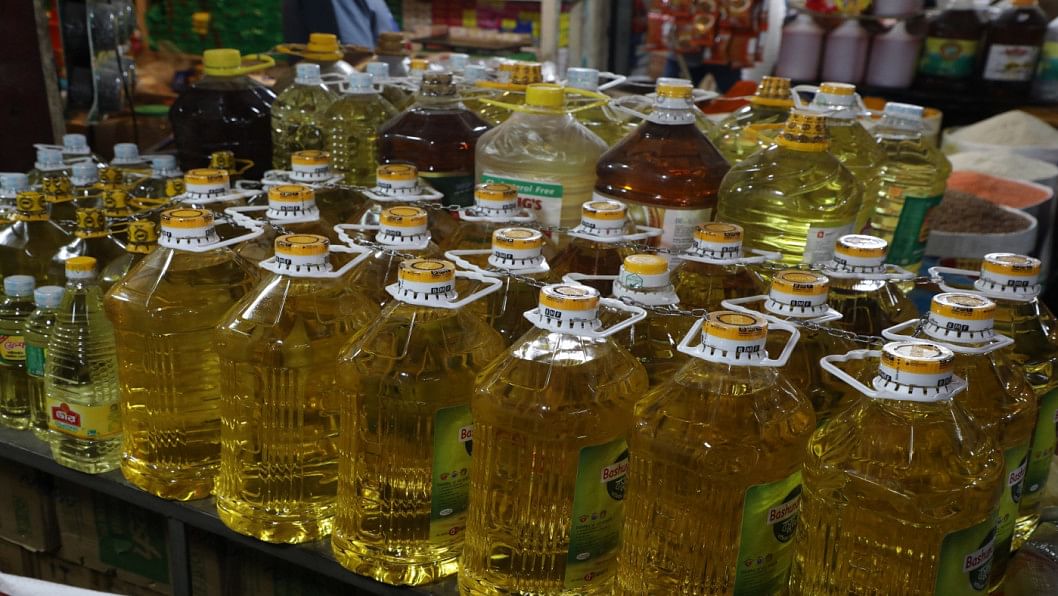Trump’s high tariffs on China may lower edible oil prices globally: importers

The Trump Administration's imposition of high tariffs on goods made in China may help to reduce the price of soybean seeds and edible oil in Bangladesh, traders and importers said.
China's retaliatory tariffs may also discourage Chinese importers from buying US goods, they added.
If Chinese importers reduce imports of US goods, the demand for US soybean oil will fall, leading to a drop in prices. When the price of soybean falls in the US, the price will similarly fall on the global market, according to them.
China is the largest importer of US soybean oilseeds at present, but may soon decide to source soy oilseeds from Brazil and Argentina, they said.
The prices of poultry feed, dairy products and cattle feed may also fall in line with the drop in edible oil prices.
Bangladesh's annual demand for edible oil stands at 25 lakh tonnes. Imports from the US meet nearly 45 percent of this requirement.
The price of American soy seeds is now in a downtrend, said Md Taslim Shahriar, deputy general manager (accounts) at Meghna Group of Industries (MGI).
Soybeans are currently being sold at $480 per tonne on the global market, down from $530 per tonne six months ago, he said.
He added that prices may fall further if the Russia-Ukraine war is halted, saying around 50 to 60 local feed mills were forced to close down due to the effects of the war and the sharp depreciation of the Bangladeshi currency against the US dollar.
Shahriar made the remarks at the two-day Crushcon, a programme for traders organised by the US Soybean Export Council (USSEC). The event was held simultaneously in Dhaka and Dubai.
However, edible oil prices may be affected by Indonesia's decision to increase bio-fuel generation from palm seeds, especially as around five percent of palms were damaged due to inclemenet weather, the senior MGI official said.
Indonesia currently has a mandatory 35 percent blend of palm oil-based fuel in biodiesel and is seeking to ramp up to biodiesel containing 40 percent palm oil to cut its energy imports, according to a Reuters report.
"Soybean prices will go down further as it is the peak season for soybean harvests. So, there is a good supply now," added Md Sariful Islam, owner of PCF Feed Industries in Dhaka.
Rafiqul Islam, manager of procurement (import) at Aftab Feed Products Ltd, said it is difficult to say whether the imposition of higher tariffs levied on China by the US would help reduce prices of soybean meal since it did not happen during Trump's last tenure despite the same measures.
He also said Trump prefers trade to war, adding that if the Russia-Ukraine war is stopped, stability may reduce global soybean prices.
At a panel discussion on the sidelines of the event in Dubai, Kevin Roepke, the USSEC's regional director for South Asia and Sub-Saharan Africa, said trade can reduce the critical issue of food inflation and benefit the masses.
Khabibur Rahman, country team lead of Bangladesh at the USSEC, said the situation in Indonesia may lead to a shortage of 10 million tonnes of palm oil in the global markets this year, which would push edible oil prices globally.
However, previous trends show that local crushers rely more on US soybean seeds, he added.
Bangladesh's soybean imports from the US have been increasing in recent years. In marketing year 2022-23, Bangladesh imported 1.89 million tonnes of soybean, meal and oil, according to data from the USSEC.

 For all latest news, follow The Daily Star's Google News channel.
For all latest news, follow The Daily Star's Google News channel. 



Comments